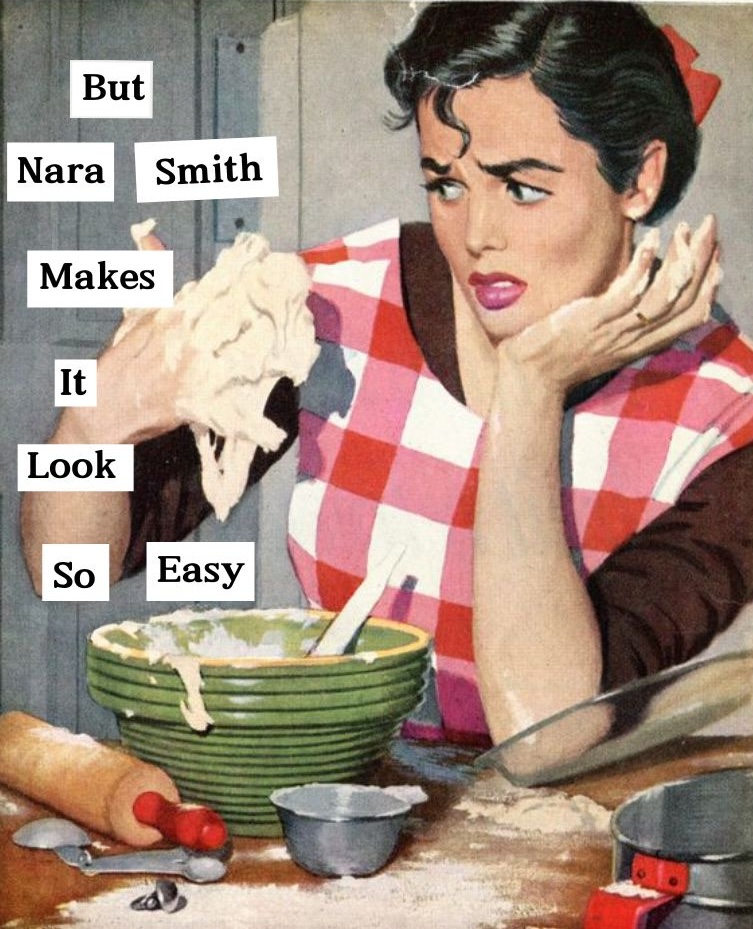The “tradwife” movement may appear as a trendy celebration of traditional gender roles on social media, but it insidiously reinforces patriarchal ideals that undermine women’s autonomy and perpetuates outdated norms.
Have you ever thought about making toothpaste from scratch? What about Cheetos? For Nara Smith, tackling these questions is her lifestyle brand. Smith is known for her viral cooking videos and lifestyle content on TikTok. Married to fellow model Lucky Blue Smith, she is also a mother of three and often posts her family life and occasionally her professional modeling career.
A “tradwife” is a woman who conforms to traditional gender roles — generally as a submissive homemaker — to serve a man playing the dominant provider. Smith is credited for popularizing the “tradwife” movement on social media and as outlandish as her content may seem, her videos routinely get around 25 million views on TikTok.
While women may feel they are “choosing” to focus on family care, that choice often comes in a context where they lack equal societal value and support to pursue the same careers and leadership roles as men.
I associate the tradwife with cleanliness: the picture-perfect American family. I see a woman bending over backward to deep clean her brand-new marble counters, making meals for her husband and constantly shuffling her kids to and from every extracurricular activity imaginable.
Smith reinforces this narrative through her social media posts that depict homemaking, cooking elaborate meals and managing family care in an unrealistic setting. She often shares meticulously styled photos of perfectly organized kitchens and videos of herself preparing multi-course dinners from scratch. Smith’s romanticization of these tasks indirectly promotes the idea that a woman’s primary role is within the domestic sphere. This visual content, often framed as an empowering or personal choice, masks the deeper patriarchal structures that limit a woman’s autonomy.
The glorification of homemaking may seem liberating, but it distracts from the profound societal pressures that confine women to traditional gender roles. While women may feel they are “choosing” to focus on family care, that choice often comes in a context where they lack equal societal value and support to pursue the same careers and leadership roles as men. By romanticizing domesticity, this narrative erases structural barriers — like the wage gap, lack of parental leave and unequal division of unpaid labor — limiting true freedom. Rather than empowering women, this content reinforces outdated gender roles and contributes to a woman’s continued marginalization in the public eye.
The brilliance — and danger — of this “soft patriarchy”, meaning traditional family men who are “active and emotionally engaged” fathers according to the Ethics & Public Policy Center, lies in its relatability.
TikTok’s algorithm plays a decisive role in shaping what is desirable, and it is clear that traditional gender roles often get an exaggerated share of positive attention. When creators lean into the “tradwife” persona — showcasing homemaking, caregiving and submission within a patriarchal framework — they are often rewarded with likes, shares and supportive comments. Online, conforming to rigid gender norms is socially acceptable and widely celebrated.
The brilliance — and danger — of this “soft patriarchy”, meaning traditional family men who are “active and emotionally engaged” fathers according to the Ethics & Public Policy Center, lies in its relatability. TikTok is designed for short, viral content, making it easy to condense complex gender dynamics into easily consumable messages. The visual appeal, often enhanced by high production values and the influencer’s charm, presents these ideas as wholesome, aspirational and entirely unobjectionable.
How is it natural for someone to balance taking care of three toddlers while making them organic and grass-fed fruit roll-ups? The problem is compounded by influencer culture on TikTok, which thrives on relatability and trend-following. When influencers like Smith attract millions of views, a portrayal of traditional gender dynamics is further normalized, embedding hetero-patriarchal values in youth culture without the audience even realizing it.
The traditional family unit — where men provide and women nurture — is portrayed as the key to societal success, reinforcing nationalistic ideals that prioritize conformity and uniformity within gender roles.
Tradwife content on TikTok also taps into conservative values that extend beyond mere lifestyle choices, subtly promoting a worldview grounded in religion, nationalism and rigid gender norms. These creators frequently invoke religious teachings, especially from Christianity, to justify traditional gender roles, framing them as divinely ordained. Phrases like “God’s design for the family” or “Biblical womanhood” according to Teen Vogue reports on the phenomenon, are commonly used to reinforce the idea that men should lead and women should submit.
For instance, many of these influencers cite Proverbs 31, a Biblical passage praising the “virtuous woman” who takes care of her home and family; she is defined as the gold standard for women. This religious narrative creates a moral high ground, positioning traditional gender roles as not only preferable, but inherently good. Such content aligns with conservative Christian ideals, which have long promoted the patriarchal family as the ideal societal structure.
This content often overlaps with American nationalism, emphasizing the idea of a “strong family” as the cornerstone of a stable nation. The traditional family unit — where men provide and women nurture — is portrayed as the key to societal success, reinforcing nationalistic ideals that prioritize conformity and uniformity within gender roles.
The emphasis on traditional gender roles inherently marginalizes non-heteronormative family structures.
These influencers may subtly reference the decline of the “traditional family” as a societal problem, feeding into a larger conservative narrative that blames social progress, feminism and LGBTQ+ rights for perceived moral decay. By framing the patriarchal family structure as a solution to these broader societal issues, these creators enforce heteronormativity and entrench the idea that deviation from this model is a threat to the fabric of society.
Tradwife content upholds the idea that heterosexual marriage is the natural and ideal state. The emphasis on traditional gender roles inherently marginalizes non-heteronormative family structures. LGBTQ+ individuals, as well as anyone who rejects the binary of male leadership and female submission, are excluded from the vision of family life that “tradwife” influencers promote. By glorifying a nuclear family unit, they perpetuate a social structure that devalues queer relationships and alternative family dynamics, reinforcing patriarchal norms in a way that aligns with broader conservative politics.
By subtly weaving in religious and nationalistic ideals, these influencers are promoting homemaking tips and traditional lifestyles — and reinforcing a more extensive system of hetero-patriarchy. This system views deviation from conventional gender roles as not just abnormal but as a threat.
The rise of “tradwife” content on TikTok stretches beyond trendy — it is a regressive push toward patriarchal values, cleverly disguised as a modern lifestyle choice. “Tradwife” influencers romanticize traditional gender roles, framing women’s domesticity and caregiving as empowering, while men are positioned as natural leaders. This subtle messaging reinforces rigid, heteronormative ideals and undermines gender equality, all while appealing to younger audiences through aesthetically polished content.
By intertwining religion, nationalism and the glorification of the nuclear family, this movement promotes a return to restrictive roles, often vilifying feminism and LGBTQ+ rights. Beneath the surface, the tradwife trend is about reshaping society in ways that limit women’s autonomy and reinforce outdated power structures.
We must challenge the glamorization of these ideals as they risk undoing the progress toward true equality.


